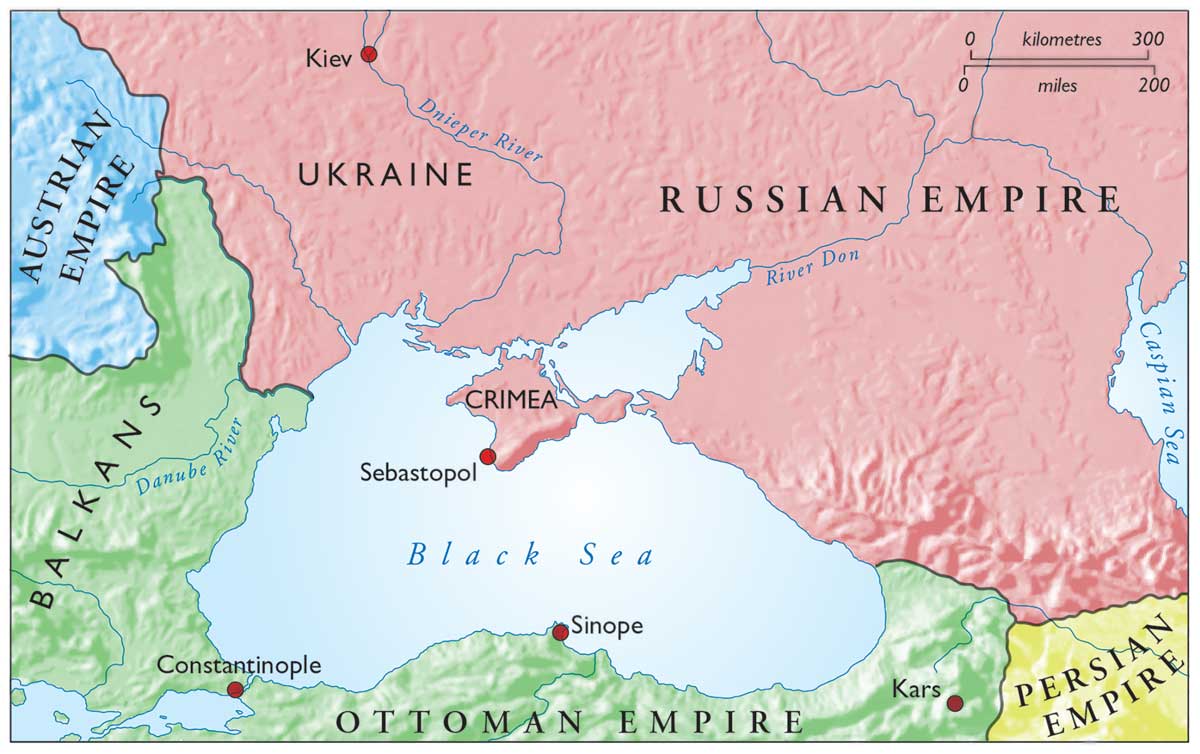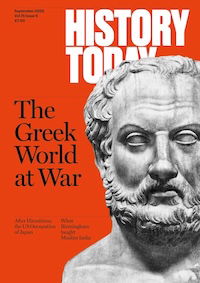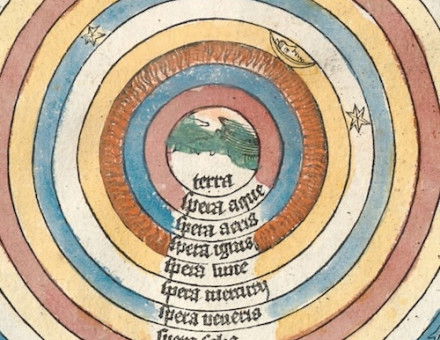Sebastopol Besieged
The legacy of the Crimean War still resonates in Ukraine, as Hugh Small explains.

The Crimean War (1854-56) was a disappointment to the British because peace broke out just when, with their French, Turkish and Italian allies, they seemed to be gaining the upper hand over Russia. For more than a century afterwards, English-language histories of the war tended to play down this disappointment by writing off the war as unnecessary. Only since the collapse of the Soviet Union in 1989 have historians reappraised the conflict and shown how much was at stake in the most destructive war of the 19th century: it equalled the American Civil War in casualties and left a legacy that still divides Ukraine and the Caucasus.
The conflict began in July 1853 when Russia invaded and occupied some Balkan provinces (now Moldova, Romania and Bulgaria), which then formed semi-autonomous parts of the Ottoman Empire. Turkey declared war on Russia and lost a naval battle at Sinope in the Black Sea later that year. The battle was seen as a Russian atrocity by some and Britain and France declared war on Russia early in 1854. They sent a force of 60,000 men to what is now Bulgaria to drive the Russian troops out of the Ottoman provinces, but the Russians withdrew in the face of strong Turkish military resistance. Britain and France then invaded the Crimean peninsula, which Russia had taken from the Ottomans within living memory and won a decisive victory at the Battle of the Alma. They laid siege to the Russian naval base at Sebastopol (now more commonly Sevastopol); the battles of Inkerman and Balaclava took place when the Russians sent troops to try to lift the siege. France and Britain captured half of the port by assault in September 1855 but Russia then captured the key Turkish city of Kars and used this gain to achieve a favourable outcome in the negotiations that ended the war in April 1856.
The historian A.W. Kinglake published his eight-volume account of the war in the 1860s and 1870s. His face-saving explanation for its outbreak was that a weak British government allowed itself to be manipulated into war by the French, by the Turks and by The Times, which had whipped up Russophobia. He portrayed a peaceful Britain drifting into a pointless conflict, led astray by scheming foreigners, incompetent ministers and circulation-hungry newspapers.
Diplomatic drift
Kinglake influenced subsequent historical accounts, which often cited ‘diplomatic drift’ as the cause of the war. As a result it was categorised as ‘unnecessary’ – meaning that Britain had no objective that could not have been obtained by competent diplomacy.
Then, in 1991, there came a change. That year the naval historian Andrew Lambert claimed that Britain had entered the war to counter Russia’s challenge to the global power of its navy. Sir James Graham, minister in charge of the Royal Navy, had engineered the attack on Sebastopol (Russia’s only permanently ice-free port) because he saw the attack on the Turkish navy at Sinope as a challenge to the Royal Navy’s supremacy.
It is remarkable that it took 130 years before a historian examined available correspondence to discover that there was some intelligence at work in Britain’s decision to attack Sebastopol. Evidently the destruction of Russian naval power could not be achieved through diplomacy alone and in that sense at least the war was not, in Lambert’s analysis, ‘unnecessary’.
In 1999 Winfried Baumgart made another step forward by analysing the attitude of the other European countries and found, surprisingly, that they were in favour of an attack on Russia. If we take the five Great Powers of Europe (Austria, Britain, France, Russia, Prussia), bound by the 1815 Congress of Vienna into an equivalent of the UN Security Council, the vote in favour of war against Russia was three to one (counting Russia as the one against), with one abstention (Prussia). Other smaller states, such as Spain, Sweden and Italy, were queuing up to fight with Britain and France against Russia, which had no allies.
This pan-European approval encouraged Britain and France to go to the defence of the Ottomans. The 1815 Congress of Vienna had established the Concert of Europe, a system of collective security designed to stop other aggressors, as it had stopped Napoleon. The objectives of the supporting countries are relevant in deciding whether the war could have been avoided by diplomacy alone.
Between 1750 and the outbreak of the Crimean War, Russia annexed Finland, the Baltic states, Poland (in contravention of the Congress of Vienna), Ukraine west of the Dneiper, Crimea and parts of the Caucasus. Western Europe was concerned that Russia would continue its march westwards and wage proxy wars in other countries, as it had done in the Carlist War in Spain in the 1830s. Even the fall of the Tsars in 1917 did little to halt Russian expansion. The continuity of the advance by Russia and then the Soviet Union before and after the Crimean War is striking.
A hawkish alternative
In 1854 Lord Palmerston planned to halt this expansion through military action, nibbling away at the more recently acquired dominions by supporting national independence movements. Britain had followed this strategy during the liberation of South America and the benefit to Britain was the opening up of trade with newly-independent liberal states. Russia controlled the Danube delta and was preventing Ukrainian producers from exporting grain by that route; freeing up this trade was one of Britain’s objectives.
More conservative members of Britain’s coalition government and the court were opposed to the idea of breaking up the Russian Empire, which they saw as a force for stability in Europe. They were persuaded to go to war by the Russian insult to the Royal Navy at Sinope. They accepted a limited war aim – the destruction of the Russian naval base at Sebastopol in the Crimea, which would put an end to Russia’s ambition to rival the Royal Navy while leaving the empire intact. But when Sebastopol resisted more fiercely than was foreseen, Palmerston became prime minister by popular demand, the conservatives left the coalition and the bombardment of Sebastopol became unnecessary. The stage was now set for Palmerston’s war of liberation, starting with the Crimean peninsula.
What went wrong? French army reserves and British naval power together should have been able to isolate the Crimea and arm its indigenous population of Tatars, starve Sebastopol into submission and move on to liberate the Caucasus. The allies could rush troops to any point on the Black Sea quicker than Russia, which had no railways to compete against Brunel’s Great Britain and the other steam vessels used by the Allies as troopships. But the war of liberation never materialised. Britain’s armed forces remained under the control of the court and the aristocracy, who were able to influence military strategy independently of Parliament. The local commanders would not commit the superior allied infantry and cavalry to a war of liberation. France, which had born the brunt of the casualties, gave up in the face of British obstruction of the agreed ‘field campaign’ strategy and the war ground to a halt. Half of Sebastopol had by then fallen to the French and the dockyards destroyed. Britain was obliged to ‘declare victory’ to a public who had never been told that a war of liberation was officially on the agenda.
The Crimean War produced the worst possible result for western Ukraine. The Crimea’s indigenous people fled or were deported by Russia and the peninsula was rapidly repopulated with Russians, one reason why it is the most ethnically Russian part of the Ukraine. Temporarily deprived of the dockyards that had allowed it to defend its enclaves on the coast of the Caucasus, Russia also pursued a new land-based military strategy of ethnic cleansing and repopulation.
Europe as a whole suffered as a result of Britain’s bungled interference. The Concert of Europe collapsed in the face of the inability of the Continent’s powers to subdue an earth-built fortification in a remote outpost of Russia. Austria and Prussia saw that they could no longer count on European solidarity to defend them against Russian bullying. The Concert was replaced by an era of realpolitik, in which states made opportunistic bilateral military alliances, setting the scene for the First World War.
During the Soviet era the liberal dream of a Europe of independent states defended by the Concert of Europe was considered to have been an impractical fantasy. The bipolar configuration of the Warsaw Pact and NATO seemed to be the only recipe available for maintaining stability. Only after the sudden passing of the Soviet Union did it become apparent that a Europe of sovereign non-aligned states might be stable after all. The irony is that the Crimean War, which was designed to achieve that goal by military force, instead set it back for more than a century.






